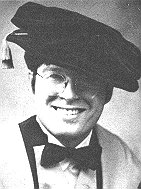Daniel J. Plasse

Ph. D. Thesis
The Nature and Origin of Granulation Textures in Class 1 Titanomagnetites
(PDF - Mb)
The hydrothermal alteration of basaltic titanomagnetite in low-grade metamorphic environments has been examined using samples from Bermuda, the Azores and Iceland. Granular TiO2 (anatase) and amorphous Fe-Ti oxide are shown to replace titanomagnetites in lavas from Bermuda and the Azores, whereas sphene is thought to replace titanomagnetites in Icelandic rocks. The initial stages of titanomagnetite dissolution are examined at extremely high magnifications using a scanning transmission electron microscope, and TiO2 granules as small as 30 A are observed replacing a titanomagnetite from the Azores.
Laboratory dissolution studies indicate that temperature, acidity and reaction time have an important effect on the alteration state of titanomagnetites observed in nature. Fresh titanomagnetite in direct contact with acidic fluids (pH less than 3) alter to granular or pseudomorphic textures at relatively low temperatures (150 to 250oC) after only one week reaction time at a confining pressure of 0.5kb. Granulation textures are not produced in runs where solution pH is greater than 3, even at temperatures as high as 250oC. Extrapolation of these results over geologic time periods suggests that granulation textures require at least 100 years to form under zeolite grade metamorphic conditions if fluids are near neutral pH.
Fluid chemistry has an important effect on the stability of TiO2-rich alteration products of Fe-Ti oxides. The replacement of titanomagnetite by anatase (TiO2) instead of sphene (CaTiSiO5) in the Azores and Bermuda is consistent with the types of secondary minerals observed in these areas. The stability of TiO2-clay-carbonate mineral assemblages such as those observed in the Azores and Bermuda are probably indicative of former XCO2 levels in excess of 1% in the altering fluid, whereas in Iceland, sphene-zeolite type assemblages probably equilibrate at lower XCO2 levels under the same P-T conditions.
Keywords:
Pages:
Supervisors: James Hall



